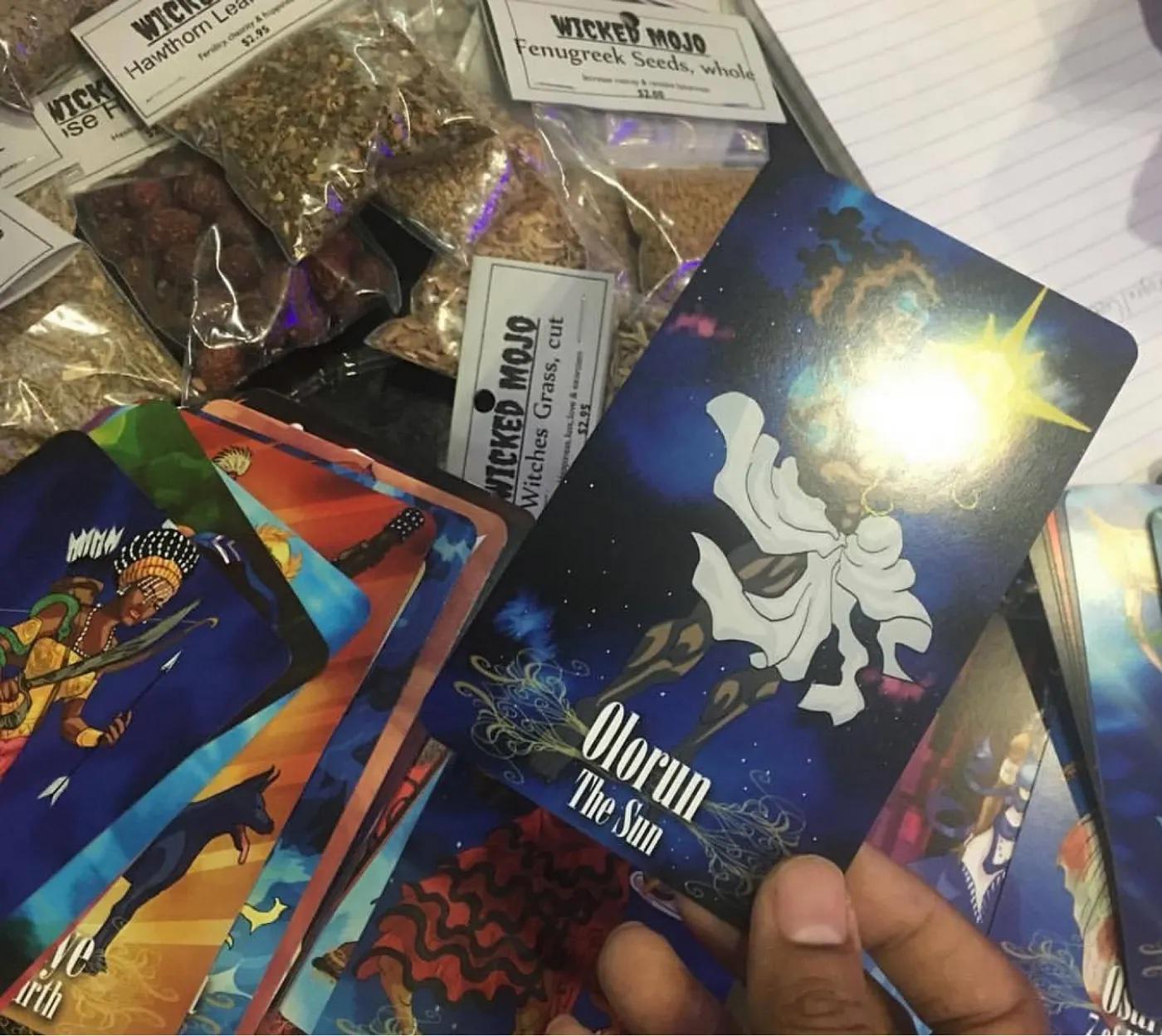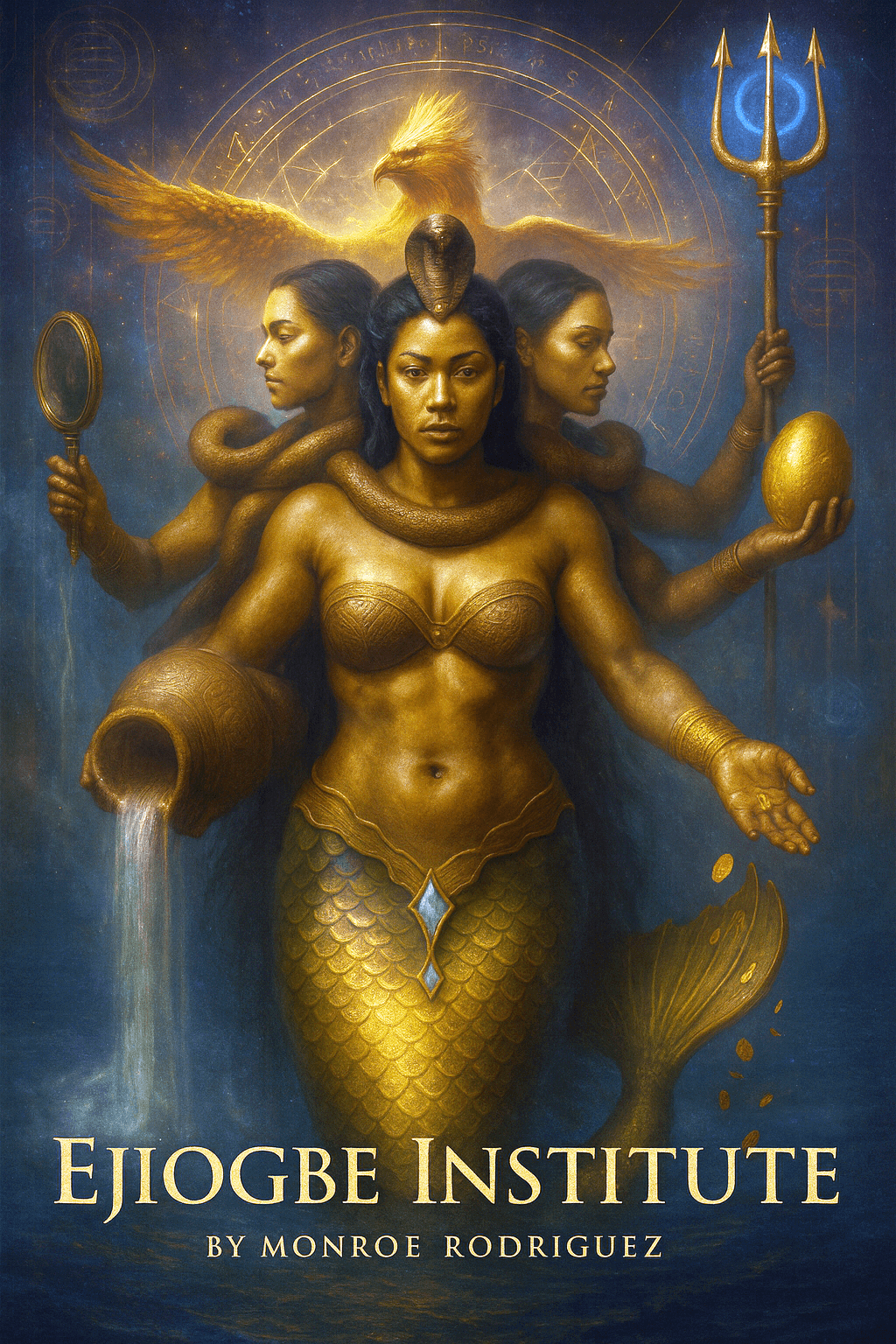
In 2015, I launched the Vudu Tarot Project — a visionary, ancestral, and radically Black reclamation of the tarot space.
What began as a spiritual calling during my seclusion in initiation ceremonies became a decades-defining shift in how the African diaspora would see itself reflected in sacred Tarot and Oracle cards.
Before that, the only decks even remotely connected to our traditions were created by outsiders or filtered through Catholic imagery. None were authored or illustrated by initiated Black artists.
I changed that.
Born From Vision, Not Commerce
The Vudu Tarot Project was seeded in a vision I had during my first initiation in Palo Mayombe. I saw the night sky, and floating within it, symbols from both Bantu cosmology and Nsibidi script, glowing in gold — veves and spiritual glyphs unlike anything I had ever seen.
That moment rewired me.
What followed were dreams, downloads, and years of multidisciplinary research across Isese, Santeria, Shango Baptist, Candomblé Ketu, Xango, Batuque, Jurema, Kimbanda, 21 Divisions, Conjure, Hoodoo, Santisima Muerte, Hinduism, Yoga, Reiki, Sikhism, Tantra, Ifá, Vodun, Palo, Umbanda — all built on 20+ years of experience as an Afro Indigenous Caribbean American tarot reader, published poet, exhibited artist, musical theater actor, tech creative,
At that time, the tarot landscape looked like this:
• New Orleans Voodoo Tarot
• African Tarot
• Tarot Lukumi
• Afro-Brazilian Tarot
• African American Tarot
• Tales of the Orishas
Nearly all of them were created by non-Black authors and artists. Even when some initiates were involved, the visuals were filtered through Eurocentric or Catholic lenses.
I Was the First to Change the Narrative
With the Vudu Tarot Project, I became the first Black initiated artist to:
✔ Depict Lwa, Vodun, Nkisi, Conjure Heros, Folk Saints, Brazilian Entities, African Spirits and Orisha with Black / Brown skin
✔ Design cards without Catholic saint overlays
✔ Build a visual, digital library of diasporic spirits from Africa, the Caribbean, and the Americas — free and public
It was innovative. Unapologetic. Ahead of its time. Saying no to whitewashing and colonization.
And it was copied everywhere.
Life Interrupted — But the Vision Survived
When I launched the Kickstarter, I believed the world was ready. But life had other plans.
During the production phase, I was working with other artists as well as my regular software developer job when I was suddenly diagnosed with chronic heart failure — a death sentence by every medical standard. Around the same time, my mother was diagnosed with cervical cancer, which progressed from stage 1 to stage 4 in three years.
I stepped away from everything for three years, caring for my mother when no one else would.
Even as her body weakened, she told me:
“I want you to finish your project. I want you to be acknowledged.”
Sadly, She didn’t survive.
But the Vudu Tarot Project did.
And so did I.
Through alternative healing, rituals, alternative plant medicines, and initiation, I recovered — fully — from what the doctors said was incurable.
My Work Has Been Copied — Everywhere
Since releasing my concepts and artwork online, I’ve seen my influence:
• Shared across TikTok, Facebook, Pinterest, YouTube — with no credit
• Painted as murals in Benin, Togo, Brazil, and Haiti
• Turned into t-shirts, statues, flyers, merch, and religious branding
• Used by spiritual houses, festivals, books, and lectures — often without permission
Influence Without Acknowledgment
I’ve directly influenced a generation of Orisha and Vodou artists — visually, thematically, and spiritually. Some of those artists gained visibility and acclaim while my original work remained uncredited:
• Bruno Loeser copied my use of gold veves, Bantu cosmological glyphs, and indigenous-coded linework, an aesthetic I originated in my early visionary sketches for the Vudu Tarot Project.
• Felipe Caprini visibly shifted his entire aesthetic after my work gained traction — echoing my composition, spiritual motifs, and symbolic layering.
• Hugo Canuto included in his anthologies (Contos dos Orixas) images by other artists (André “Andrea” Hora) who blatantly plagiarized my visual language, and when I called it out, I was ignored and excluded rather than respected.
Now, it’s gone even further.
A disturbing number of my original artworks — including stylized portraits of spirits, rituals, and cosmologies — have been fed into AI platforms like Midjourney, where new “AI artists” remix and profit off my visual DNA without my name, consent, or presence.
Meanwhile, major publishers like Llewellyn and Destiny Books released tarot decks (Orisha Tarot, Vodou Tarot, Hoodoo Tarot) that follow a blueprint I laid down a decade before.
What I once offered as ancestral healing has been scraped, diluted, and commodified in algorithmic engines, generating derivative content that mimics my style — but erases my spirit.
This isn’t just about imitation.
It’s about spiritual theft at scale.
And the platforms, festivals, and publishers benefiting from it rarely ask:
Who started this visual conversation?
The answer is me.
And it’s time I was named.
It’s Not Just About the Money
Yes, my Kickstarter failed.
Yes, I lost money. More of my
Own money than was donated. And Years of my life working on this project.
But what hurts more is the erasure.
The gaslighting.
The way people have profited from my art, my rituals, my language, and my shrines — without even saying my name.
This is spiritual colonialism dressed up as representation.
And it’s still happening.
And Still, I Name My Inspirations
I was inspired by the Orisha photography series by Noire 3000 Studios.
I was encouraged early on by Klaudia Krindges, a Brazilian artist who saw the vision and said my name.
Stephen Hamilton was not an artistic influence on the Vudu Tarot Project, but he was an inspiration to me as a Black American LGBTQ+ artist who studied in Nigeria, became a multidisciplinary creator, and chose to uplift community through art and education — just as I have.
I believe in naming those who came before.
I believe in spiritual integrity.
I believe lineage matters.
So this is me naming myself — again — before anyone else tries to rewrite the record.
I Said It First
Before Llewellyn’s Orisha Tarot.
Before Destiny’s Hoodoo Tarot.
Before the festivals and podcast panels.
Before the t-shirts and coloring books.
There was the Vudu Tarot Project.
And I — Monroe Rodriguez, also known as Sikh Diviner — created it.
I am not “Unknown Author” or “Unnamed Image found on Google”.
My mother knew it.
My spirits know it.
Now the world should too.
